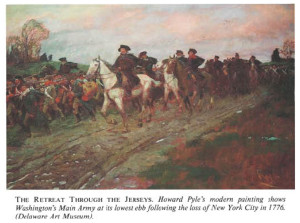Chris Palmer on “Ten Crucial Days: The Trenton–Princeton Campaign, December 25, 1776–January 4, 1777”
 After the Battles of Long Island and White Plains and losses of Forts Washington and Lee, Washington retreated south. The British army pursued and the Revolution appeared to be lost. Washington made it across the Delaware but General Lee dallied and was captured. Washington was trying to pull together other retreating army units to Pennsylvania and regroup. Many American enlistments would end on December 31 and the situation was dire. The British were issuing citizen pardons in New York and New Jersey, Loyalists rejoiced and sent peace feelers to end the conflict. Howe was becoming certain it would end and went into winter quarters in New York and Cornwallis prepared to go home on leave. Washington decided to strike before the end of the year at the Trenton, New Jersey garrison of British and Hessian troops. The campaign over the next ten days turned the Revolution around and both sides knew a long conflict would follow.
After the Battles of Long Island and White Plains and losses of Forts Washington and Lee, Washington retreated south. The British army pursued and the Revolution appeared to be lost. Washington made it across the Delaware but General Lee dallied and was captured. Washington was trying to pull together other retreating army units to Pennsylvania and regroup. Many American enlistments would end on December 31 and the situation was dire. The British were issuing citizen pardons in New York and New Jersey, Loyalists rejoiced and sent peace feelers to end the conflict. Howe was becoming certain it would end and went into winter quarters in New York and Cornwallis prepared to go home on leave. Washington decided to strike before the end of the year at the Trenton, New Jersey garrison of British and Hessian troops. The campaign over the next ten days turned the Revolution around and both sides knew a long conflict would follow.
Chris Palmer is a professional geologist with emphasis on hydrogeology and engineering geology. His geologic practice is throughout the greater Bay Area with occasional work in other states, mostly in groundwater production and contaminant assessment. Originally an east coast native (New Jersey), Chris has lived in California for nearly 43 years. While his profession is geology, his avocation is history. As a life-long history student he is especially interested in the Revolutionary War, Civil War, history of science, and general historical topics. He is a member of the Sons of the American Revolution Silicon Valley Chapter and is the color guard commander, showing color at various parades and supporting veteran groups in the Bay Area.
